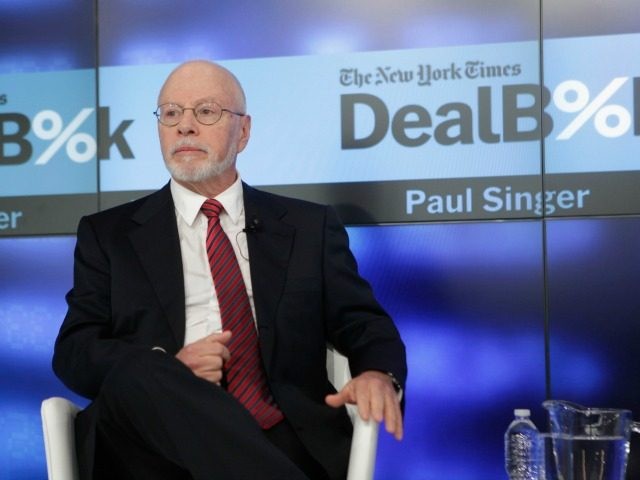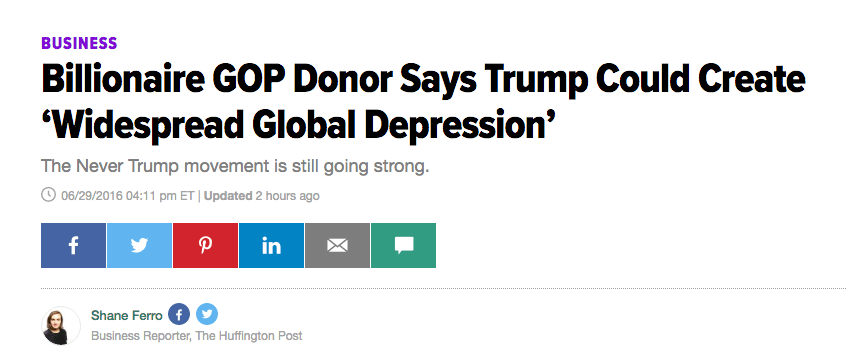Establishment GOP mega-donor and hedge-fund investor Paul Singer has come out swinging against Donald Trump, shortly after a Wall Street report showed that Trump’s economic reform plan would likely slash the value of Singer’s investments.
“The most impactful of the economic policies that I recall him coming out for are these anti-trade policies,” Singer told a group people at the elite Aspen Ideas Festival in Colorado, according to CNBC. “I think if he actually stuck to those policies and gets elected president, it’s close to a guarantee of a global depression, widespread global depression.”
The apocalyptic slam against Donald Trump by the billionaire hedge-fund owner was touted in an uncritical report by The Huffington Post, which normally believes itself to be skeptical about Wall Street’s policy recommendations.
Singer’s hedge-fund, titled Elliott Management Corp., keeps secret how its $23 billion or more is invested worldwide. However, media reports show that it has recent investments tied up in foreign real-estate, solar-power companies in the United Kingdom and the Hess oil company. In the past, it has profited from collecting unpaid debt in troubled economies, such as the Congo and Argentina.
The fund reportedly has major investments in Cabela’s outdoor stores, the Comcast media company, and in New York real-estate. It recently bought a software unit from Dell Computer, and invested in the PulteGroup home-construction company.
But a new report from Moody’s shows that Trump’s economic policy could hurt many Wall Street investors, and including Singer, whose stock-market wealth is estimated to be around $8 billion.
Trump’s tax plans include an increased tax on capital gains, up to 20 percent, which would directly hit Wall Street ‘s short-term investors and bankers, including Singer, according to the Moody’s study. That’s especially bad for New York real-estate values.
Also, Trump’s his opposition to low-wage immigrant labor would reduce corporate profits by driving up Americans’ salaries, and also cut national housing prices for young families, the study predicts.
“As the immigrants leave, the already-tight labor market will get tighter, pushing up labor costs as employers struggle to fill the open job positions,” the report acknowledged. “Mr. Trump’s immigration policies will thus result in … potentially severe labor shortages, and higher labor costs,” the critical report promises. The formal unemployment rate would immediately drop by a third, from 5 percent in 2016 to 3.5 percent in 2017, the report predicts. Housing prices would drop by almost 4 percent in 2018 and 2019, says the Moody’s report.
Trump’s policies could also trim international trade, and force more corporate investment inside the United States, where company profits would be cut by higher wage costs.
The Moody’s report says stock prices would tumble by almost 30 percent by the end of 2019, partly because the departure of the illegal migrants would force up salaries and also reduce the number of taxpayer-supported consumers. But the Moody’s report also shows the stock market rocketing upwards after 2018, by roughly 40 percent from 2019 to 2021.
The Moody’s report was prepared by Mark Zandi, a long-standing, self-declared Democrat and an advocate for Democratic policies. In June 2015, for example, he donated the legal maximum of $2,700 to Clinton’s campaign.
Trump has also called for a one-year or two-year pause in legal immigration. That would cut the supply of new labor in those years by roughly 20 percent, further forcing up wages and high-tech investment.
Currently, the federal government allows 1 million foreign wage-cutting migrants to enter the United States each year, even though 4 million young Americans enter the weak job market each year. Trump has also called for reforms to the white-collar guest-worker programs, which would also increase salaries for American college-grads.
Moody’s report echoes the 2013, report by the Congressional Budget Office, which predicted that the much-touted “comprehensive immigration reform plan” would shift national income from wage-earners and from salary-earners over to Wall Street investors. That plan is a mirror image of Trump’s pro-American labor reforms, because the 2013 plan sharply increased immigration and the use of cheap guest-workers.
The 2013 cheap-labor plan was strongly supported by GOP House Speaker Paul Ryan, who is now opposing Trump and his labor reform plans.
In 2015, Singer supported Sen. Marco Rubio in the GOP’s 2016 primary race. In 2013, Rubio spearheaded the White House-backed campaign to increase the flow of foreign labor and consumers into the Unite dStates. That push for cheap labor was rejected by the GOP’s primary voters.


COMMENTS
Please let us know if you're having issues with commenting.